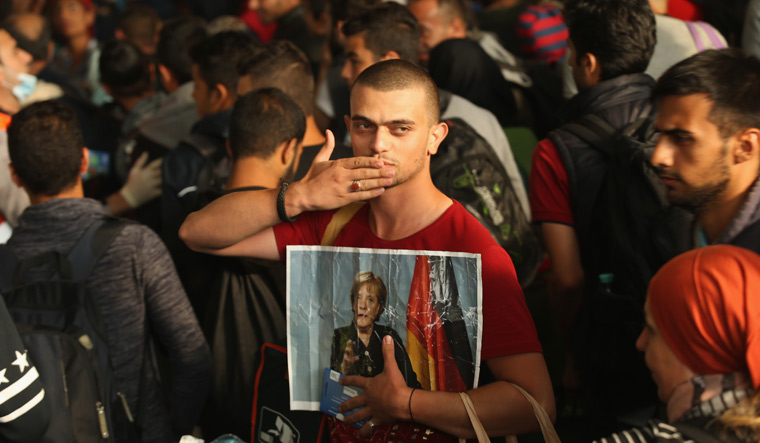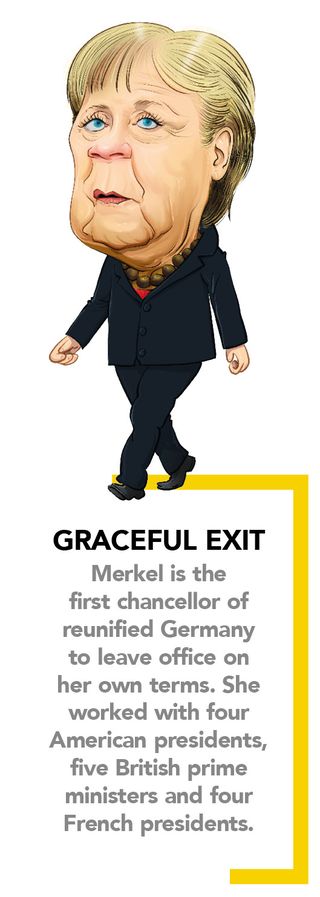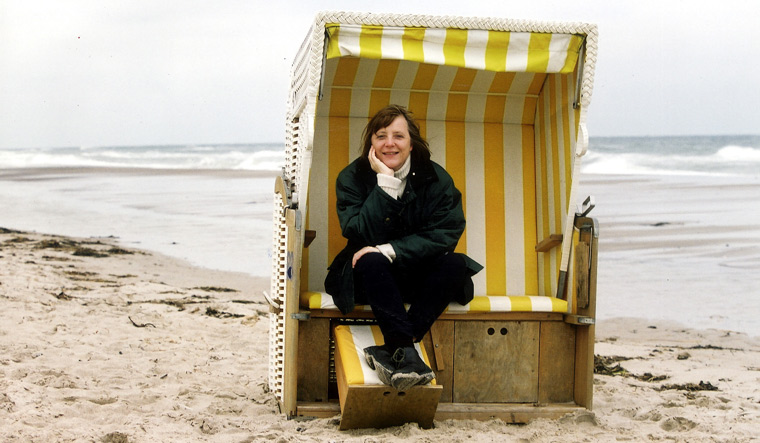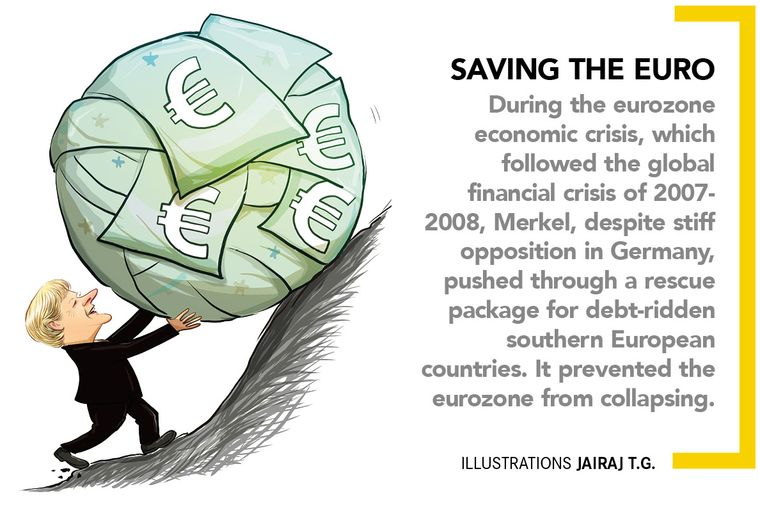On the night of November 9, 1989—when the Berlin Wall came down, heralding the collapse of the communist regime in East Germany—tens of thousands of delirious youngsters crossed over to the West, taking in the sights and sounds of freedom, and of course, capitalism. Angela Merkel was not among them. “It was Thursday, and Thursday was my sauna day. So that's where I went—in the same communist high-rise where we always went," she said in an interview many years later. Merkel, who was then a 35-year-old quantum chemistry researcher at a government institute in East Berlin, did indeed cross into the West later that night, but she was back home early enough to get ready for work the next morning.
More than 30 years later, as she steps down as chancellor of Germany after serving four consecutive four-year terms, Merkel might acknowledge that it was perhaps this pragmatism that helped her survive a long tenure, working with four American presidents, five British prime ministers and four French presidents.
Merkel was not just pragmatic, she was also ruthlessly ambitious. Her father was a Lutheran preacher who moved his family to East Germany a few months after she was born. Merkel entered active politics only after the fall of the Berlin Wall and not many people thought that she would be successful in the conservative and predominantly Catholic Christian Democratic Union (CDU). She was from the East, was divorced and was a Protestant. But she was noticed by the then chancellor Helmut Kohl, who wanted a female politician from the East in his cabinet. For Kohl, Merkel was “mein Mädchen (my girl)", and her rise among a group of hard-drinking, womanising, cutthroat male politicians was quiet and unobtrusive.
But she took her chance when Kohl got engulfed in a campaign finance scandal in 1999. She wrote a guest column in the conservative daily Frankfurt Allgemeine Zeitung, blaming Kohl for the fiasco and asking him to step down from CDU leadership. It was the end of Kohl’s political career. A few months later, Merkel took over as head of the CDU, and five years later as the third chancellor of reunited Germany.
The first few years in power were relatively easy sailing, as Germany enjoyed unprecedented prosperity, riding on former chancellor Gerhard Schröder’s structural reforms which propelled economic growth. Her first major challenge was the eurozone crisis, which came in the wake of the global financial crisis of 2007-08. Europe was split down the middle with its spendthrift southern periphery of Greece, Italy and Spain on the one side and the parsimonious north, including Germany, on the other.
The US, under president Barack Obama, feared the unravelling of the European project, and wanted Merkel to loosen her purse strings. It was a major challenge for her as the German public was clearly opposed to it. At the 2011 G20 summit at Cannes, French president Nicolas Sarkozy and Obama literally cornered her and insisted on a financial package for Greece and Italy. As the pressure became unbearable, Merkel started crying. “That is not fair,” she said about the bailout package. “I am not going to commit suicide.”
Merkel was referring to the conservative Germans who adored thrift and abhorred debt. She, however, stepped in at the last moment, pushing through a rescue package which imposed tough austerity measures on the southern European countries. And, it was not an act of charity. Most of the bailout money was, in fact, used to pay back lenders, especially the German banks.
Merkel’s greatest moment as chancellor came in the summer of 2015, when about a million refugees from the Middle East crossed the Mediterranean into Greece. She knew that cash-strapped Greece would be unable to deal with the problem and announced, uncharacteristically, that Germany would take them in. She waived EU rules which permitted Germany to turn refugees back to the first EU country they had passed through. And she did not even consult her cabinet or the parliament. It was a personal decision for which she took full responsibility. “Wir schaffen das (We can do it),”she told the rattled Germans.
But she scaled back on the refugee resettlement plan as the crisis resulted in several law and order problems and terrorist attacks. She negotiated with Turkish President Recep Tayyip Erdogan a $4 billion deal to stop the refugee flow. There was some criticism that the refugee crisis helped the German industrial sector to tide over the labour problem caused by the introduction of the statutory minimum wage.
Merkel’s cold, calculating side was evident also during her dealings with key partners like Russia and China. She was guided by “Wandel durch Handel (change through trade)”, the theory which posited that deepening economic relations would encourage progressive reforms in Moscow and Beijing. With Russian President Vladimir Putin, she shared a love-hate relationship. When she first went to visit him, he gave her a small stuffed toy dog. During the next visit, Putin let Konni, his big, black Labrador, walk up to Merkel. The chancellor, who is mortally afraid of dogs, did not flinch. But she never stopped engaging with Russia throughout her tenure.
Merkel has often stepped in to smoothen the rough edges of the west’s relations with Russia. When Russia annexed Crimea, Merkel stepped in and led the peace negotiations, resulting in the Minsk agreement. At the same time, she did not hesitate to put together a sanctions regime against Russia.
Yet, despite enormous pressure from US President Joe Biden and her European allies, she did not abandon Nord Stream 2, the pipeline project which will bring Russian natural gas to Germany, circumventing Ukraine and Poland. She was convinced that the project was in Germany’s national interest.
With China, too, Merkel’s motives have been largely economic. China is the biggest market for German automobile majors. It was the Chinese market which saved Germany from slipping into a depression in 2009. “Merkel remained beholden to the post-Cold War mindset that expanding economic ties would render China a ‘responsible stakeholder’in the global system, and never adjusted to signs that China was abusing the asymmetric dependencies inherent in such ties to challenge key precepts of the global system,”said Daniel S. Hamilton of the Johns Hopkins University School of Advanced International Studies. But with China continuing to be aggressive economically and politically, Merkel has been scaling down the engagement. The EU-China investment agreement championed by her is on the back burner. Similarly, the plan to allow Huawei into Germany’s 5G network, too, is likely to be shelved.
While she has been invested in maintaining good ties with Russia and China, India was never a priority for Merkel. She did not miss the fact that while German trade with India is worth about $23.5 billion annually, China had a trade volume of $250 billion in 2020. Merkel visited India four times during her tenure, the most by a German chancellor. She was, in fact, the first foreign leader to visit India after Jammu and Kashmir was bifurcated into two Union Territories in 2019. But bilateral ties never really took off under her watch.
“Merkel's term was a period of unmet expectations in Indo-German relations,”said Uma Purushothaman, who teaches international relations at Central University of Kerala. “India didn't really have a role in her scheme of things. Her recent remarks about India being 'allowed' to become a pharmaceutical major in the wake of the Covid pandemic betrayed a lack of sensitivity and lack of appreciation of India's progress and achievements.”
During the pandemic, Germany blocked a broad waiver of rules protecting intellectual property on the production and export of vaccines and other critical medical goods. “The German refusal to waive intellectual property regulations has made it difficult for the global south to procure vaccines, medicines and even testing kits,” said Shiju Mazhuvanchery, who teaches trade law at Sai University, Chennai. Merkel defended her position citing monetary support to COVAX, a global vaccine procurement and distribution programme.
According to most reports, Merkel was planning to quit politics after her third term ended in 2017, but she was persuaded to stay on for another term—some say by Obama—after Donald Trump was elected US president. She offered him cooperation, but spelt out her conditions quite clearly. “Germany and America are bound by common values–democracy, freedom, as well as respect for the rule of law and the dignity of each and every person, regardless of their origin, skin color, creed, gender, sexual orientation or political views,” she said. “It is based on these values that I wish to offer close cooperation.”
From the day Trump took over, Merkel used every possible opportunity to drive home the point that the liberal world order based on democracy and multilateral institutions, which came into existence after the devastations of World War II, was sacrosanct, making her the “new leader of the free world”. While Trump bad-mouthed traditional European democracies, undermined NATO and fought a trade war with Germany and questioned its security commitments, it was Merkel who took the lead in preserving the transatlantic alliance with remarkable restraint and farsightedness.
“Had Merkel responded in kind to Trump, one could easily imagine a relationship in ruins,” said Jeffrey Anderson of Georgetown University, Washington, DC. “Instead, she kept the relationship on an even keel with an artful blend of de-escalation, resolve, and autonomy.”
Despite her credible achievements, Merkel was never regarded as a visionary, unlike her predecessors like Willy Brandt and Konrad Adenauer. She eschewed any grand transformative vision for her country, continent and the world. All her major achievements—resolving the eurozone crisis, opening Germany up for refugees and the defence of the liberal international order—were essentially reactions to unfolding events. Even the Nord Stream 2 pipeline was launched by her predecessor.
In three of her four terms as chancellor, including the current one, she ruled in alliance with an ideological adversary, the leftist Social Democratic Party. “Merkel’s radical centrism promoted incrementalism and a surfeit of compromises. It adversely affected Germany’s party system and ceded the opposition space to fringe elements like the far right Alternative für Deutschland (AfD),” said Joshy M. Paul, international relations expert at the Delhi-based Centre for Air Power Studies. “She adopted many of the programmes of the rival SPD, leaving both parties in ideological disarray.”
Merkel indeed is leaving her own party in turmoil, which is divided into leftist and rightist factions. The current leader Armin Laschet is facing an uphill battle in the run up to the September 26 elections. The latest opinion polls show the CDU and the SPD running neck-to-neck with 22 per cent support, while the Greens are close behind. But on individual popularity stakes, Laschet, the minister-president of the North Rhine-Westphalia state, is trailing SPD leader Olaf Scholz by a wide margin. He became the CDU supremo in a tight leadership tussle after Merkel’s hand-picked successor Annegret Kramp-Karrenbauer failed to unite the warring factions in the party and was forced to step down.
If Merkel expected her final days in office to be uneventful, the Covid-19 pandemic put paid to such hopes. But she responded well and worked with state leaders in implementing a response based on testing and lockdown. While it worked well initially, the strategy crumbled during the subsequent waves. The public has grown weary with the lockdown and the vaccination drive is plagued by inordinate delays. The pandemic has also brought to light the digital deficit in Germany. For several months, states had to use fax machines to share data in the absence of a viable software. Online classes are not working properly. Ulrich Silberbach, president of the German Federation of Civil Servants, told the broadcaster Deutsche Welle, “Germany remained a sleeping beauty when it came to digitisation”.
Merkel, however, took the lead in putting together a massive stimulus plan to revive the Covid-ravaged economy. The $950 billion package formalised on July 20 will be financed by joint bonds issued by the European Commission, and it will help regions hit hardest by the pandemic.
The pandemic, however, has completely upended the lifestyle of the intensely private chancellor, who continues to live in her old Berlin apartment with her husband and enjoys the occasional grocery shopping. She no longer has any private time. Weekends are devoted to studies and discussions with virologists. She has even stopped private meetings with artists, actors and old friends over a glass of wine.
Yet, despite all the doom and gloom, Merkel has kept Germany largely safe from the ravages of the pandemic. And, she leaves the chancellery with a sense of achievement. “Under her, Germany has once again become Europe’s centre, the key swing state on a continent in tremendous flux,” said Hamilton. “Merkel intuitively understood the hesitations of her neighbours and the uncertainties of her compatriots. Her cool, cautious and incremental style reassured other countries about Germany and reassured the Germans about themselves. That is perhaps her greatest legacy.”






